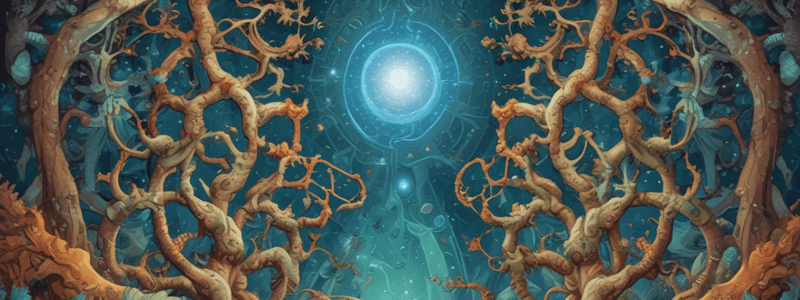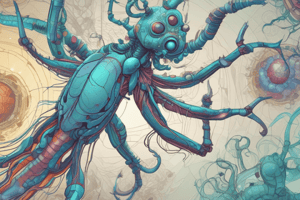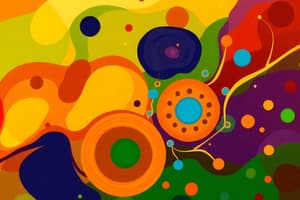Podcast
Questions and Answers
Which branch of biology focuses on the study of heredity and genetic variation?
Which branch of biology focuses on the study of heredity and genetic variation?
- Botany
- Genetics (correct)
- Microbiology
- Zoology
Which process converts light energy into chemical energy in living organisms?
Which process converts light energy into chemical energy in living organisms?
- Mitosis
- Respiration
- Gene Expression
- Photosynthesis (correct)
What is the primary role of proteins in living organisms?
What is the primary role of proteins in living organisms?
- Transport oxygen in the bloodstream
- Store genetic information
- Provide structural support for cells
- Catalyze metabolic reactions and replicate DNA (correct)
Flashcards
What is a cell?
What is a cell?
The basic building block of life, containing the essential components for a living organism to function.
Photosynthesis
Photosynthesis
The process where plants use sunlight to make their own food.
What is an ecosystem?
What is an ecosystem?
A community of living organisms interacting with their physical environment.
Study Notes
Definition and Scope
- Biology is the scientific study of life and living organisms, including their structure, function, growth, evolution, distribution, and taxonomy.
- It explores the diversity of life, from molecules to ecosystems, and examines the interactions between living organisms and their environment.
Branches of Biology
- Botany: study of plants and plant-like organisms
- Zoology: study of animals and animal-like organisms
- Microbiology: study of microorganisms, such as bacteria and viruses
- Ecology: study of the relationships between organisms and their environment
- Genetics: study of heredity, genes, and genetic variation
- Biochemistry: study of the chemical processes that occur within living organisms
- Molecular Biology: study of the structure, function, and interactions of biological molecules, such as DNA and proteins
- Evolutionary Biology: study of the processes that have shaped the diversity of life on Earth
Basic Concepts
- Cells: the basic structural and functional units of life
- Organisms: individuals that consist of one or more cells
- Tissues: groups of similar cells that perform specific functions
- Organs: structures composed of two or more tissues that work together to perform specific functions
- Organ Systems: groups of organs that work together to maintain homeostasis and perform specific functions
- Ecosystems: communities of organisms and their physical environment
Biological Molecules
- Carbohydrates: provide energy and structure for organisms
- Proteins: perform a wide range of functions, including catalyzing metabolic reactions and replicating DNA
- Lipids: provide energy and structure for organisms, and serve as signaling molecules
- Nucleic Acids: contain the genetic information necessary for life, including DNA and RNA
Biological Processes
- Photosynthesis: process by which organisms convert light energy into chemical energy
- Respiration: process by which organisms convert chemical energy into ATP
- Mitosis: process of cell division that results in two daughter cells with the same number of chromosomes as the parent cell
- Meiosis: process of cell division that results in four daughter cells with half the number of chromosomes as the parent cell
- Gene Expression: process by which the information in a gene's DNA is converted into a functional product, such as a protein.
Definition and Scope
- Biology is the scientific study of life and encompasses various aspects such as structure, function, growth, evolution, distribution, and taxonomy of living organisms.
- It investigates the diversity of life ranging from molecular levels to entire ecosystems.
- Interactions between living organisms and their environments are a focal point of biological studies.
Branches of Biology
- Botany: Focuses on the study of plants and plant-like life forms.
- Zoology: Involves the study of animals and their characteristics.
- Microbiology: Examines microorganisms, including bacteria and viruses.
- Ecology: Analyzes relationships and interactions between organisms and their environments.
- Genetics: Explores heredity, the role of genes, and genetic variation.
- Biochemistry: Investigates the chemical processes and substances that occur within living cells.
- Molecular Biology: Studies the structure, function, and interactions of biological molecules like DNA and proteins.
- Evolutionary Biology: Looks into the processes that contribute to the diversity of life on Earth over time.
Basic Concepts
- Cells: The fundamental structural and functional units that make up all living organisms.
- Organisms: Entities that may be unicellular or multicellular, composed of one or more cells.
- Tissues: Collections of similar cells that work together to perform a specific function within the body.
- Organs: Structures made of two or more types of tissues that collaborate to execute specific functions.
- Organ Systems: Composed of multiple organs working together to maintain homeostasis and perform essential roles.
- Ecosystems: Comprise communities of organisms and their physical surroundings, highlighting their interdependence.
Biological Molecules
- Carbohydrates: Serve as a source of energy and provide structural support in organisms.
- Proteins: Essential for a variety of functions, including catalyzing metabolic reactions and DNA replication.
- Lipids: Function as energy reservoirs, structural components, and signaling molecules in biological networks.
- Nucleic Acids: Key molecules that store and transmit genetic information, primarily DNA and RNA.
Biological Processes
- Photosynthesis: Converts light energy into chemical energy, primarily in plants and certain microorganisms.
- Respiration: Transforms chemical energy from nutrients into ATP, the energy currency of cells.
- Mitosis: A type of cell division resulting in two genetically identical daughter cells, maintaining chromosome number.
- Meiosis: A specialized form of cell division producing four genetically diverse daughter cells, each with half the chromosome count of the parent.
- Gene Expression: The process through which genetic information is translated into functional products, such as proteins, impacting organism characteristics.
Studying That Suits You
Use AI to generate personalized quizzes and flashcards to suit your learning preferences.




